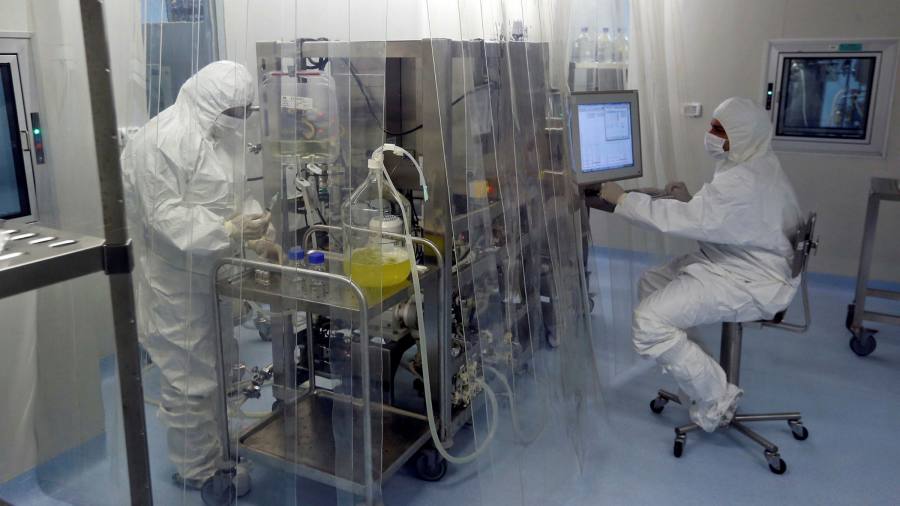[ad_1]
Cuba is starting final-stage trials of two new coronavirus vaccines developed in the country, which if successful could help boost an economy mired in one of its worst ever crises as well as curb the pandemic.
Eduardo MartÃnez, president of state pharmaceutical conglomerate BioCubaFarma, which is overseeing vaccine development, told reporters in Havana that thousands of people had participated in earlier trials of its Soberana 2 and Abdala vaccines, which showed a “potent immunological response†and no serious side-effects.
Soberana means “sovereign†in Spanish, underlining the communist government’s message that its development is a symbol of pride for a country that remains under a crippling US embargo.
State-run media have shown footage of factories churning out thousands of doses of the two vaccines. Both are conventional immunisations in which part of the coronavirus spike protein is fused to a carrier molecule to make it stable.
Two more Cuban vaccines — including one administered via a nasal spray — are at an earlier stage of testing.
Soberana 2 will now be tested on 44,000 Cubans, as well as thousands of people in Iran and Venezuela, both of which are allies of Havana. Mexico could potentially also take part, according to authorities there and in Cuba.
Two doses will be administered two weeks apart and no special refrigeration is required, according to the government. Initial results are expected by May. The Abdala trials are expected to start later in March.
If the trials proved successful, BioCubaFarma said it would produce 100m doses by the year’s end. About 20m-30m would be needed for the local population and the remainder would be available for export.
Officials say Cuba will export its Covid vaccines at cost price plus a small margin to support its free universal healthcare system. Patents may be licensed abroad for production and vaccines donated to the poorest countries.
“Outside Cuba, there’s a lot of surprise and even scepticism that [it has] four vaccines in progress†said Helen Yaffe, a Cuba expert at Glasgow university in the UK. “But for anyone who has followed developments in Cuba it makes sense.â€
The island nation has decades of experience in biotechnology and immunology. In the 1980s, Cuba’s then leader Fidel Castro set up the industry to get around the US embargo. Since then, its laboratories have produced novel drugs that have been sold around the world, such as the first meningitis B vaccine, interferons and the only effective treatment for serious diabetic ulcers.
“The pandemic has hit Cuba’s economy as hard as anyone’s,†said one senior European envoy. “But it also offers a chance to draw Cuba towards international heath co-operation. The Cuban system is in slow-motion collapse, but Cuban biotech and pharma R&D has much to offer.â€
While Cuba has drawn global attention for its programme to send thousands of health professionals abroad to help 40 countries battle the pandemic, its development of medicines to treat Covid-19 at home is less well known.
Cuba produces 13 medicines used to fight the disease and half of those are Cuban innovations, the government says. They include two anti-inflammatory drugs, itolizumab and Jusvinza, which the government claims have a high success rate in treating critically ill patients and which have been deployed in India and other countries.
While Cuba is experiencing a surge in coronavirus numbers, they remain low by international standards. Early treatment of suspected cases, rigorous contact tracing and a strong neighbourhood-based health system have kept mortality down to 2.84 deaths per 100,000 in the population, a fraction of the Latin American average, according to figures from Johns Hopkins University in the US.
“Their whole response to Covid-19 has been outstanding,†said Yaffe.
But Cuba needs partners if it is to produce large quantities of its vaccines for export, diplomats say. “The vaccines seem to be reliable, according to my sources, but they do not have sufficient productive capacity due to a lack of resources and will have to look outside, for example to Vietnam and Iran,†a Latin American ambassador said.
“The US embargo really limits access,†said Arachu Castro, professor of public health in Latin America at Tulane university in the US. “Cuba has a lot of difficulties accessing medication and medical equipment that has any US component,†she said.
Ricardo Torres, a Cuban economist and government critic, said a successful vaccine would boost the country’s crisis-hit economy. Gross domestic product fell 11 per cent last year and products from basic food and hygiene products to medicines are in short supply.
Tourism has been hit especially hard amid the pandemic, dropping 79 per cent last year and accounting for at least 20 per cent of the fall in GDP, he said. Meanwhile, new US sanctions targeting areas including fuel imports and finance have hit agriculture and other sectors.
“It comes at a sensitive time at home and will definitely increase people’s confidence in the government,†he said. “It could also attract [more] attention to the country’s biotech complex.â€
“If successful,†added Peter Kornbluh, a senior Cuba analyst at the National Security Archive, a US non-governmental research organisation, “Cuba’s development of a vaccine will become another renowned example of a small island nation making a historic contribution to world events far beyond its size.â€
[ad_2]
Source link






